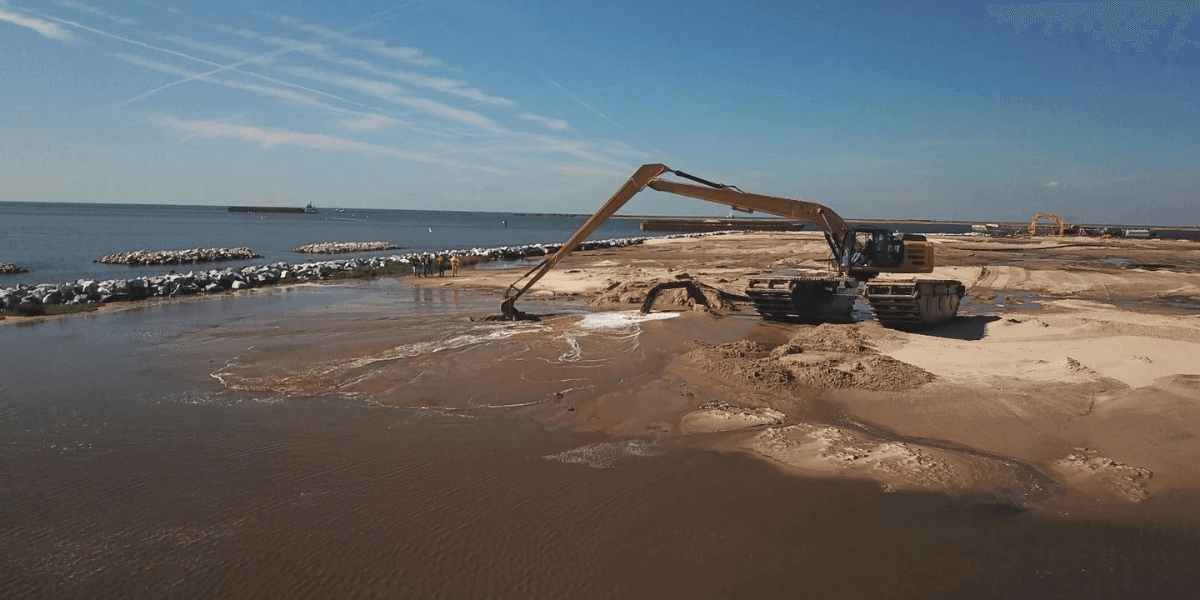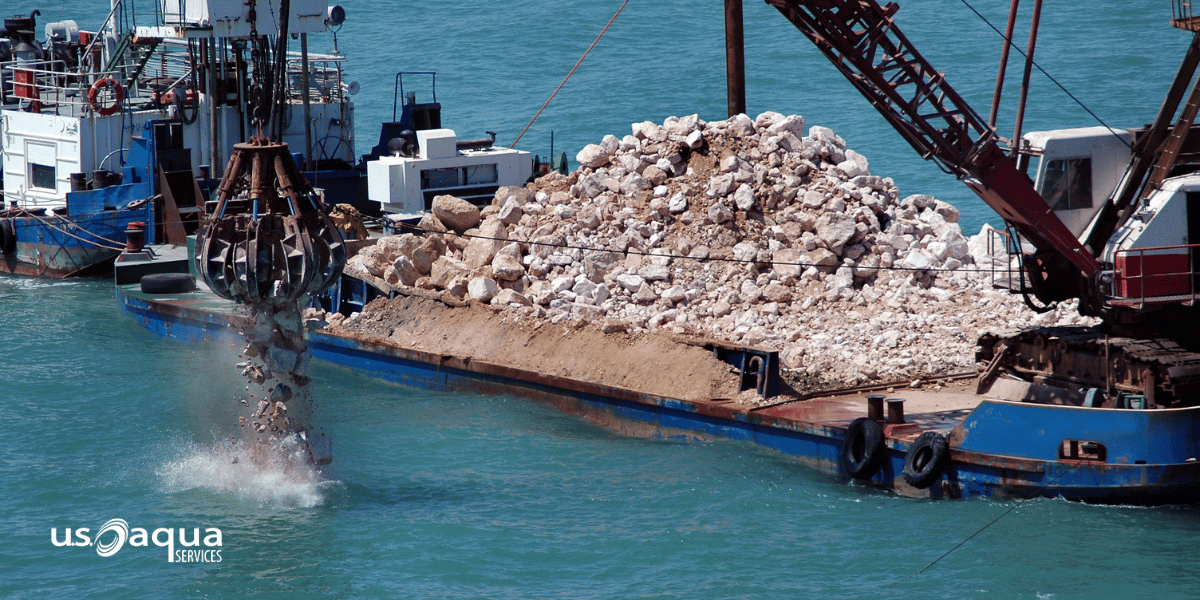What Is a Marsh Buggy? Everything You Need to Know
A marsh buggy, also known as a marsh excavator, is an amphibious machine designed to operate in wetlands, swamps, and waterlogged terrain....
5 min read
U.S. Aqua Services May 27, 2025 11:47:16 AM
Dredging is vital in keeping waterways clear, protecting coastlines, and restoring natural land. Whether you’re handling beach reclamation, river maintenance, or wetland restoration, the right equipment is essential to keeping your project on schedule and within budget. But owning this equipment can be expensive, hard to maintain, and even harder to store.
That’s why many project managers are choosing dredging equipment rentals. Renting allows you to control costs, stay flexible, and access the exact machines needed for each job phase.
This guide will explain why renting makes sense, what equipment you should consider, and how to prepare your team and site for a successful project.

Owning dredging equipment comes with a high upfront price. Between purchasing costs, insurance, and depreciation, it's often not worth the investment unless the equipment is used year-round. Rentals allow you to pay for the machines only when needed, freeing up your budget for labor, fuel, permits, or unexpected costs.
The provider also maintains rental equipment. That means you won’t worry about hidden repair bills or replacing aging machines. You get access to well-maintained, modern equipment every time.
Heavy-duty machines like excavators, amphibious vehicles, and marsh buggies require storage space, protective housing, and regular servicing, even when unused. Rentals remove that burden. Once your project wraps up, the equipment returns to the rental company. There’s no need to maintain a fleet or manage storage facilities long-term.
Dredging projects can change quickly. Site conditions may shift, new access points may open, or timelines may be shortened. Renting allows you to respond to those changes without delay. If you suddenly need an amphibious personnel carrier or a Fat Truck to access a flood-prone zone, you can add it to your equipment list without purchasing it outright. This flexibility helps you keep your operations running smoothly.
Rivers often collect sediment that blocks water flow or impacts navigation. Removing that material helps reduce flood risks and maintain safe channels. These environments can be unpredictable, with unstable riverbanks or fast-moving water. Renting the right dredging equipment lets you scale your fleet to meet the conditions, whether clearing a narrow stream or a wide waterway.
Beaches and shorelines are vulnerable to erosion. You need machines working in sand, shallow water, and soft terrain when restoring these areas. Marsh buggies and tracked amphibious vehicles are ideal for this kind of work. Renting allows you to choose the best tools for reclaiming land and rebuilding beaches without committing to large capital purchases.
Dredged material can support wetland recovery, rebuild natural barriers, and raise land elevation. But moving that material takes the right kind of equipment. You can transport and place sediment efficiently without stressing your equipment by renting amphibious excavators and carriers. This helps maximize the value of the dredged material while keeping your site productive.
These machines are built for soft, wet, or partially flooded areas. Amphibious vehicles can travel through shallow water, marshes, and wetlands where traditional wheeled machines get stuck. Amphibious vehicles transport gear, haul dredged material, or carry tools across sites with poor ground stability.
Fat Trucks and other personnel carriers are designed to safely transport crews in rough terrain. If your site is muddy, flooded, or remote, these vehicles allow workers to access the site quickly and safely. Rentals make bringing these into your project easy without adding new training or purchasing costs.
Marsh buggies are designed to float over soft soil and mud. They use wide tracks to reduce ground pressure, making them excellent for shoreline work, wetland restoration, or shallow dredging tasks. You can rent them with or without attachments, depending on the job.
Standard excavators are great for dry land but often fail in swampy or unstable terrain. High-flotation excavators are built for these environments. Their wider tracks and lighter footprint allow them to operate safely on soft ground. Renting these machines allows you to handle tricky terrain without investing in niche equipment.
Your team can start immediately when equipment is delivered on time and tailored to the job. Rental providers often deliver gear quickly, sometimes within days. That means you don’t have to delay a start date or wait for your owned equipment to be freed up from another job.
Well-maintained equipment means fewer breakdowns and fewer delays. If a machine malfunctions, most rental agreements include replacement or repair support. This lowers your risk of downtime and protects your schedule. You also avoid the risk of underutilizing expensive purchased equipment after completing a project.
To make sure your rental experience runs smoothly, use this checklist:
Check Site Access: Confirm that roads and paths are wide and stable enough for delivery trucks and heavy equipment.
Understand Soil Conditions: Know what terrain you’re dealing with—sand, silt, mud, or standing water.
Train Your Team: Ensure your crew knows how to use the equipment safely. Some rentals may include operator training.
Get the Right Permits: Check local or federal regulations around sediment handling, waterway access, and transportation.
Set a Communication Plan: Contact your rental provider for support, scheduling, or equipment changes.
Taking time to prepare ensures your team gets the most out of your rental investment.
Renting equipment from a company offering dredging services gives you additional support. These providers understand real-world dredging challenges. They can recommend the best equipment for your conditions, train your team, and provide ongoing field support.
Instead of managing the logistics alone, you benefit from a team that knows how to keep projects moving. This saves time, reduces errors, and improves your results in the field.
Renting dredging equipment gives project managers more control. It reduces overhead, simplifies logistics, and allows you to adjust as your job evolves. Whether you're working on river dredging, coastal reclamation, or inland restoration, the right rental choices can help you avoid delays and finish strong.
Focus on results, not ownership. Rent what you need, work with experienced providers, and keep your project moving forward with confidence.
How Dredging Helps With Water Management - Here's more information on how dredging can help with water management.
U.S. Aqua Services was created to support the dredging process in advancing commerce and responding to its many challenges. To accomplish this, our dredging company assembled an exceptional group of experienced individuals and a diverse inventory of dredge equipment and excavator dredge pumps.
We offer dredging equipment rental services so you can have access to the latest and greatest in dredging technology without having to pay to maintain it, transport, and store it, along with dewatering services.
With an emphasis on mobility, dependability, durability, diversity, efficiency, and safety, our dredging rental company can ensure that our different types of dredging systems are easy to move through any terrain and can work in the most rugged and remote environments. Our multi-function hydraulic systems are built with jetting and mechanical options that can efficiently move loose sediment or stiff layers of clay.
US Aqua services also and maintains a ready fleet of amphibious equipment capable of completing dredging projects in some of the harshest and most remote environments. U.S Aqua is also the dealer for Louisiana of the amphibious vehicle Fat Truck. No matter the size or scope of the job or the remoteness of your work location, you can rely on Fat Truck’s industrial off-road utility vehicles to get the job done right.

A marsh buggy, also known as a marsh excavator, is an amphibious machine designed to operate in wetlands, swamps, and waterlogged terrain....
.png)
Dredging projects, whether coastal restoration, canal maintenance, or industrial site cleanup, require specialized tools and precise coordination....

Dredged material, the sediment removed from waterways to maintain navigation, often represents an untapped resource rather than waste. By exploring...